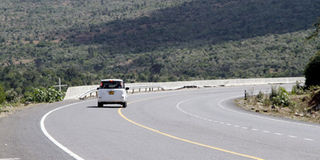The death trap that is the Ntulele black spot

The Ntulele black spot on the Narok-Maai Mahiu road. Despite many people having lost their lives in grisly accidents here, many drivers still drive at dangerously high speeds near this sharp bend. PHOTO | SULEIMAN MBATIAH | NATION MEDIA GROUP
What you need to know:
- The three kilometre stretch of the road near Ntulele’s Pinyiny hills has become a death trap.
- Despite numerous road warnings, many drivers still drive at high speeds along the black spot.
- It is here that 41 passengers travelling in a bus christened 'City to city’ perished on August 29, 2013.
- At Ntulele Police Post, there are many wreckages of vehicles that have been involved in accidents near this area.
Despite the many road signs warning of the dangers of speeding at a section of the Mai Mahiu-Narok road, most drivers will speed without seeming to care.
The three kilometre stretch of the road near Ntulele’s Pinyiny hills has become a death trap with many people having lost their lives here in grisly road accidents.
Pinyiny in the Maa language means 'the cursed area’.
A kilometre away from the sharp Pinyiny bend, as one descends from Ntulele Township, is a road sign urging drivers to 'Reduce Speed Now.’
After that there is another sign in red says 'Engage low gear’ followed by a scarier 'death trap’ sign standing just metres away from red luminous strips drawn across the road warning one to take care as they approach the sharp Pinyiny hills’ bend.
It is here that 41 passengers travelling in a bus christened 'City to city’ perished on August 29, 2013.
Soon after, another grisly accident happened on October 25, 2013 where a 14 seater matatu crashed killing nine people on the spot.
The reality sinks in when you visit the infamous spot where a three metre high white cross inscribed with the words, 'May God Bless Our Roads’ the first plea directly to God to restore sanity on Kenyan roads, has been erected.

Red lines have been drawn at the Ntulele black spot to warn motorists to drive carefully.
My solemn minute long silence was rudely interrupted by a speeding four wheel drive vehicle that was closely followed by four vehicles driven in the same reckless manner.
Ntulele means a place where wild fruits grow in the bush. And true to its name, Ntulele Township is an oasis of its own kind, despite its name being associated with death and grisly accidents.
You will know you are entering Ntulele from Mai Mahiu when you meet many motorcycles carrying charcoal and lorries with many young men sitting pretty but dangerously atop the metallic rafts at the back of the lorries.
After a series of bumps you slow down to a lush view of healthy maize crops, barley and wheat rolling over its many hills.

A road sign warning drivers that they are approaching the Ntulele black spot.
Compared to Mai Mahiu, Suswa, Nairegie-Enkare and Duka Moja, Ntulele has potential for growth as it has a good climate and is only 15 kilometres away from Narok Town.
Very serious farming is practiced here but you hardly see residential houses akin to the capital intensive farming activities practiced here.
However, as you enjoy the serene view of the scenic environment, you are quickly disrupted by the many vehicle wreckages parked at Ntulele Police Post. Most of them are private cars.
We drive into Ntulele trading centre and find many women selling dry maize stashed in cooking fat tins while others sit on sacks of charcoal waiting for buyers.

A road sign warns drivers to reduce speed as they approach the notorious Ntulele black spot.
Ntulele shocks me, as traditionally women are supposed to remain at home looking after children, cooking and tending to livestock while men go to the trading centre to purchase essentials.
But in Ntulele, women have created a new benchmark where they have also become providers for their families.
I proceed to Pinyiny area, and as I alight, a group of monkeys slowly walk away but quickly return to pick a piece of sugarcane given to them by a generous matatu driver.
They seem to know who is friendly and who is not.
A tourist van also slows down and the monkeys move near it giving the tourist a close glimpse of the animal said to be man’s 'closest’ kin.
The vans strictly observe the road signs while matatu drivers carefully manoeuvre their way downhill next to the newly constructed 100 metre long concrete embankment.

A concrete embankment has been erected at the Ntulele black spot following many fatal accidents.
But even this new barrier bears fresh 'scratches’ after being hit by speeding vehicles.
“If only they observed the road signs in honour of the people who lost their lives on this road that would save more lives and save families the agony of losing loved ones and breadwinners.
“The country could save billions of shillings if drivers agreed to observe all road signs and regulations,” mourns Peter Ole Sankale, a resident of the cosmopolitan centre.
Several buildings are under construction with its urban population growing fast as witnessed at Ntulele Primary School which has 653 pupils.
Some superstitious residents blame a python killed recently to be the 'carrier’ of the bad omen behind the numerous accidents.
However, this is quickly rebutted by an NTV blogger, Mr James Omondi from Mangu High School who says, “Slow down! Speed kills! Do pythons drive?”
An engineer Sammy KK says, “The causes of accidents are well known, researched and documented. These are speedingt, fatigue, poor roads and drunken driving. Forget this poor African science which is not based on any known facts.”
To the discerning visitor, Ntulele has a lot to offer as its residents are focused and hardworking with a keen eye on development.
But Ntulele’s development could be speeded up if the centre was provided with piped water.





